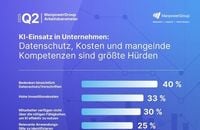Microsoft has announced a significant enhancement to its Edge for Business browser, introducing a new feature called Inline Data Protection, aimed at safeguarding sensitive corporate data in the digital workspace. This feature is designed to prevent unintentional data leaks to generative AI applications such as OpenAI's ChatGPT and Google Gemini. As businesses increasingly rely on digital tools, the need for robust data security measures has never been more pressing.
Launched on March 26, 2025, the Inline Data Protection feature allows organizations to control how their employees interact with sensitive information while using the browser. This includes managing the direct input of text into web applications and the use of generative AI prompts. Microsoft emphasizes that the functionality will continue to expand, incorporating additional applications like email, collaboration tools, and social media into its security framework.
As part of a broader strategy to enhance data security, Microsoft also announced the general availability of new security features for Microsoft Teams. These new tools are specifically designed to combat the surge in phishing attacks that have been increasingly prevalent on the platform. Cybercriminal groups, notably Storm-1674 and Storm-1811, have exploited Microsoft Teams to trick users into downloading malicious software or granting unauthorized access.
The new security measures will enable companies to better manage communications with external parties and report suspicious messages in real time. This proactive approach is crucial as organizations face escalating threats in the digital landscape.
In addition to the new protections for Teams, Microsoft is expanding its Security Copilot with eleven new agent-based solutions. These innovations are intended to analyze data leaks, prioritize critical alerts, and improve compliance with security policies. Five of these solutions are being developed in partnership with external collaborators, highlighting the importance of cooperation within the cybersecurity industry.
Vasu Jakkal, Corporate Vice President at Microsoft Security, stressed the necessity of AI agents in the modern security landscape. "The complexity and volume of cyberattacks are increasingly outpacing human security capabilities, making AI-driven solutions essential," Jakkal stated. The newly introduced Phishing Triage Agent is capable of handling routine alerts, allowing human resources to focus on more strategic tasks.
These advancements underscore the importance of integrating innovative technologies into corporate security strategies. Microsoft's approach to employing AI and machine learning to enhance data security could serve as a model for other companies looking to modernize their security measures. Continuous adaptation and enhancement of security solutions will be critical in addressing the ever-evolving threats present in the digital realm.
Meanwhile, a recent survey conducted by ManpowerGroup highlights the growing interest in artificial intelligence (AI) among companies, revealing that 44% of German firms have already implemented AI technologies in areas such as recruiting, onboarding, and training. The survey, which included responses from 1,050 employers in Germany, indicates that while many organizations recognize the potential benefits of AI, there remains a significant degree of skepticism among employees.
According to the survey, 11% of German companies utilize AI extensively in their HR processes, while 33% have incorporated AI elements into their operations. Additionally, 23% of employers plan to introduce AI within the next twelve months, and 14% intend to do so within the next three years.
Terry Cade, Managing Director of Manpower Germany, commented on the survey findings, stating, "AI will change our work, but it will not define it. It is up to us to use this technology in a way that supports rather than replaces us." Cade emphasized the need for a shift in the conversation around AI, suggesting that it should be viewed as a tool that empowers human creativity, innovation, and interaction.
Despite the optimism surrounding AI, the survey also revealed significant barriers to its adoption. Notably, 40% of respondents cited data protection and legal concerns as the primary challenges in implementing AI technologies. High investment costs were identified by 33% of companies as another major obstacle, while 30% reported difficulties in identifying relevant use cases and finding suitable AI tools and platforms.
Moreover, a lack of AI skills among employees emerged as a critical issue, with 30% of surveyed companies highlighting this as a significant challenge. Both employees (22%) and executives (21%) expressed skepticism regarding the changes associated with AI adoption.
Globally, the survey findings indicate that high investment costs represent the most significant hurdle for companies looking to implement AI, followed closely by data protection concerns (33%) and the lack of qualified personnel (30%).
Interestingly, the survey also explored attitudes towards the acceptable use of AI in the hiring process. While 29% of employers believe it is acceptable for candidates to use AI to search for jobs and employers, there are clear limits. Only 22% think it appropriate for candidates to rely on AI during assessments, and just 21% support the use of AI-generated responses in interviews.
Cade emphasized the importance of responsible technology use, stating, "AI can help optimize application materials, but authenticity and personal skills will remain central. After all, companies want to hire people, not AI."
The survey's results reflect the complex landscape of AI adoption in the workplace, where enthusiasm for the technology is tempered by concerns over privacy, cost, and the need for human skills. As organizations navigate these challenges, the focus should remain on enhancing work processes to allow employees to concentrate on what truly matters.






